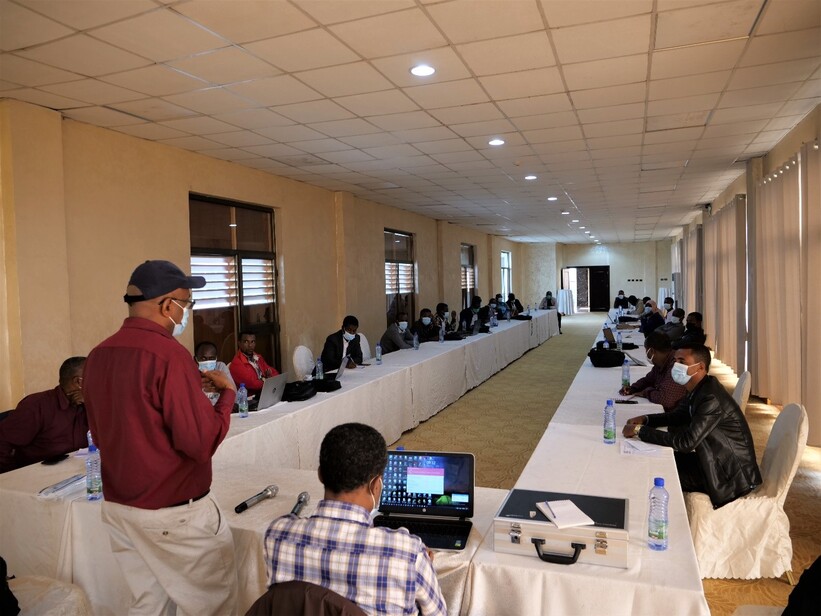
IRC Ethiopia's contribution to the WASH SDG programme has been assessed in an evaluation workshop.
Published on: 31/05/2023
A final evaluation workshop of the WASH SDG programme was held in Hawassa on 26 May 2023 to assess the benefits of the systems strengthening component of the programme supported by IRC WASH. Workshop participants from Negelle Arsi and Shashemene Woredas/Districts, West Arsi Zone, and Oromia Region WASH sector offices, i.e. water and energy, health and finance, discussed the achievements of IRC WASH as part of the WASH SDG programme. They commented on the development of the costed WASH master plans, resource mobilisation and implementation strategies, improved collaboration between sectors, capacity-building trainings and experience-sharing visits, and the WASH management information system. Muhammed Deme, the NGO liaison officer of the West Arsi Zone Finance and Economic Cooperation Department, said that the two woredas implementing the SDGs, Negelle Arsi and Shashamane, and the WASH sector offices of the West Arsi Zone have benefited greatly from the systems strengthening support.
Coordination and cooperation among stakeholders have been strengthened thanks to the Learning Alliance platform established in collaboration with IRC WASH. The Learning Alliance supported increasing sales of concrete latrine slabs, community contributions for construction/rehabilitation of drinking water projects, collection of water user tariffs, government resource allocation, household connection and preventive maintenance. Because of the Learning Alliance, Shashamane Woreda started implementing I-WASH, i.e. Integrated WASH which requires incorporating institutions in all WASH initiatives/interventions.
Shashamane Woreda used the WASH master plan, developed with support from IRC WASH, to attract NGOs. CDA, Goal and Brook are examples of NGOs supporting the implementation of the master plan. Initially, there were doubts that the woreda could not implement the master plan because the estimated costs were very high. However, with time, the woreda understood the contribution of stakeholders, such as household contributions to the construction, operation and maintenance of drinking water supply and latrines. The woreda has the capacity to support scale-up of the master plan to other woredas if there is interest from the zone.
Shashamane Woreda Water and Energy Office has received awards from the woreda and zone administration for its good performance, some of which was attributed to this project. The evaluation revealed some drawbacks, such as lack of resources to facilitate future learning alliance meetings and insufficient capacity to use the management information system.
Workshop participants showed great motivation to support IRC WASH activities. Mr Deresa Degefa of the Oromia Finance and Economic Cooperation Bureau mentioned the Bureau's low involvement, which would otherwise have helped them facilitate the presentation of IRC WASH experiences at the regional Government-NGO platform for wider application. Debela Olani of the Oromia Water and Energy Bureau expressed strong motivation to support the scaling-up of IRC WASH-supported activities and hopes that these two woredas can serve as a learning opportunity for strengthening WASH systems. He envisions these woredas becoming a destination for visitors interested in strengthening WASH systems, much like the experience of water harvesting in Mesela woreda in the West Hararge Zone of the Oromia region.
The WASH SDG programme is a DGIS-funded programme which was implemented in four woredas in two regions of Ethiopia from 2018 to 2022. Conducted in two phases (phase 1 ran from January 2018 to June 2020 and phase 2 from July 2020 to December 2022), the programme was led by WASH Alliance International (WAI) in Oromia and implemented in woredas Negelle Arsi and Shashamane. Implementing partners were Amref Health Africa, Bole Bible Baptist Church (BBBC), Wetlands, IRC WASH and Akvo. Each member of the consortium signed a separate project agreement with the regional authorities/Oromia. For instance, IRC WASH signed a project agreement with Oromia Finance and Economic Cooperation and Oromia Water and Energy Bureau. According to the monitoring and evaluation schedule of the signed project agreement, IRC WASH submitted the final project completion report to the signatories, on the basis of which this evaluation was conducted.